- Home
- Sam Christer
The Stonehenge Legacy
The Stonehenge Legacy Read online
Sam Christer lives in London.
The Stonehenge Legacy is his first novel.
Copyright
Published by Hachette Digital
ISBN 978-0-748-12360-5
All characters and events in this publication, other than those clearly in the public
domain, are fictitious and any resemblance to real persons, living or dead, is purely coincidental.
Copyright © Sam Christer 2011
All rights reserved. No part of this publication may be reproduced, stored in a
retrieval system, or transmitted, in any form or by any means, without the prior
permission in writing of the publisher.
Hachette Digital
Little, Brown Book Group
100 Victoria Embankment
London, EC4Y 0DY
www.hachette.co.uk
To my son Elliott in his last year of sixth form – I couldn’t be
prouder of everything you’ve done or how you’ve done it.
Contents
Copyright
PART ONE
Chapter 1
Chapter 2
Chapter 3
Chapter 4
Chapter 5
Chapter 6
Chapter 7
Chapter 8
Chapter 9
Chapter 10
Chapter 11
Chapter 12
Chapter 13
Chapter 14
Chapter 15
Chapter 16
Chapter 17
PART TWO
Chapter 18
Chapter 19
Chapter 20
Chapter 21
Chapter 22
Chapter 23
Chapter 24
Chapter 25
Chapter 26
Chapter 27
Chapter 28
Chapter 29
Chapter 30
Chapter 31
Chapter 32
Chapter 33
Chapter 34
Chapter 35
Chapter 36
Chapter 37
Chapter 38
Chapter 39
Chapter 40
Chapter 41
Chapter 42
Chapter 43
Chapter 44
Chapter 45
Chapter 46
Chapter 47
Chapter 48
Chapter 49
Chapter 50
Chapter 51
Chapter 52
Chapter 53
Chapter 54
Chapter 55
Chapter 56
Chapter 57
Chapter 58
Chapter 59
Chapter 60
Chapter 61
Chapter 62
Chapter 63
Chapter 64
Chapter 65
Chapter 66
Chapter 67
Chapter 68
Chapter 69
Chapter 70
Chapter 71
Chapter 72
Chapter 73
Chapter 74
Chapter 75
Chapter 76
Chapter 77
Chapter 78
Chapter 79
Chapter 80
Chapter 81
Chapter 82
Chapter 83
PART THREE
Chapter 84
Chapter 85
Chapter 86
Chapter 87
Chapter 88
Chapter 89
Chapter 90
Chapter 91
Chapter 92
Chapter 93
Chapter 94
Chapter 95
Chapter 96
Chapter 97
Chapter 98
Chapter 99
Chapter 100
Chapter 101
Chapter 102
Chapter 103
Chapter 104
PART FOUR
Chapter 105
Chapter 106
Chapter 107
Chapter 108
Chapter 109
Chapter 110
Chapter 111
Chapter 112
Chapter 113
Chapter 114
Chapter 115
Chapter 116
Chapter 117
Chapter 118
Chapter 119
Chapter 120
Chapter 121
Chapter 122
Chapter 123
Chapter 124
Chapter 125
Chapter 126
Chapter 127
Chapter 128
Chapter 129
Chapter 130
Chapter 131
Chapter 132
Chapter 133
Chapter 134
Chapter 135
Chapter 136
Chapter 137
Chapter 138
Chapter 139
Chapter 140
Chapter 141
Chapter 142
PART FIVE
Chapter 143
Chapter 144
Chapter 145
Chapter 146
Chapter 147
Chapter 148
Chapter 149
Chapter 150
Chapter 151
Chapter 152
Chapter 153
Chapter 154
Chapter 155
Chapter 156
Chapter 157
Chapter 158
Chapter 159
Chapter 160
Chapter 161
Chapter 162
Chapter 163
Chapter 164
Chapter 165
Chapter 166
Chapter 167
Chapter 168
Chapter 169
Chapter 170
Chapter 171
Chapter 172
Chapter 173
Chapter 174
Chapter 175
Chapter 176
Chapter 177
Chapter 178
Chapter 179
Chapter 180
Chapter 181
Chapter 182
Chapter 183
Chapter 184
Chapter 185
Chapter 186
Chapter 187
Chapter 188
Chapter 189
Chapter 190
Chapter 191
ACKNOWLEDGEMENTS
PART ONE
The stones are great
And magic power they have
Men that are sick
Fare to that stone
And they wash that stone
And with that water bathe away their sickness
Laghamon
1
NEW MOON, SUNDAY 13 JUNE
STONEHENGE
Mist rolls like vaporous tumbleweed in the dead of the Wiltshire night. Out in the flat, sprawling fields hooded Lookers tilt their heads skywards to witness the first sliver of silver. The moon is new, showing only a faint flash of virginal white beneath a voluminous wrap of black-velvet haute couture.
On the horizon, a pale face turns in its cowl. A fiery torch is raised in an old hand. Hushed but urgent words pass from Looker to Looker. The sacrifice is ready. He has been brought from his fast. Seven days without food. No light, nor sound, nor touch, nor smell. His body has been cleansed of the impurities he has ingested. His senses sharpened. His mind focused on his fate.
The Lookers are robed in hand-woven sackcloth, belted with string plaited from plants, their feet shod in rough animal skins. It is the way of the ancients, the creators of the Craft.
The Cleansers remove the man’s grimy clothes. He will leave this world with no more than he entered it. They pull a ring from his finger. A watch from his wrist. And fro
m around his neck, a crude gold chain dangling a symbol of some false god.
They carry him, fighting, to the river and immerse him. Cold water fills his mouth and gurgles and froths in his corrupted lungs. He struggles like a startled fish, seeking a safe current to escape the hands of his captors.
It is not to be.
Once purified, he is dragged spluttering to the shore. The Bearers fall upon him and bind him with strips of bark to a litter made from pine, the noble tree that stepped with them from the age of ice. They hoist him high on to their shoulders. Carry him like proud and loving men bearing the coffin of a beloved brother. He is precious to them.
Their walk is long – more than two miles. South from the ancient encampment of Durrington. On to the great avenue, down to where the bluestones and the forty-ton sarsens are sited.
The Bearers make no complaints. They know the pain their forefathers suffered moving the mighty stones hundreds of miles. The astroarchitects trekked through hills and valleys, crossed stormy seas. With antlers of red deer and shoulder-blades of cattle, they dug the pits where the circle now stands. Behind the Bearers come the Followers. All male. All dressed identically in hooded, coarse brown robes. They have come from across Britain, Europe and all corners of the globe. For tonight is the new Henge Master’s first sacrifice. An overdue offering to the gods. One that will rejuvenate the spiritual strength of the stones.
The Bearers pause at the Heel Stone, the massive chunk of leaning sandstone that is home to the Sky God. It dwarfs all around it, except the gigantic sarsens standing eighty yards away.
In the centre of the megalithic portal a bonfire flickers in the darkness, its smoking fingers grasping at the moon, illuminating the Henge Master as he raises his hands. He pauses then sweeps them in a slow arc, pressing back the wall of energy surging between him and the horseshoe of towering trilithons.
‘Great gods, I feel your eternal presence. Earth Mother most eternal, Sky Father most supreme, we gather in your adoration and dutifully kneel in your presence.’
The secret congregation of hooded figures sinks silently to the soil. ‘We, your obedient children, the Followers of the Sacreds, are gathered here on the bones of our ancestors to honour you and to show you our devotion and loyalty.’
The Master claps his hands and leaves them joined above his head, fingers pointing in prayer to the heavens. The Bearers rise from their knees. Once more they lift upon their shoulders the naked young man tethered to the rough litter.
‘We thank you, all you great gods who look over us and who bless us. In respect to you and the ways of the ancients, we dedicate this sacrifice.’
The Bearers begin their final journey, out through the giant stone archways towards the sacrificial point that lies on the line of the solstice.
The Slaughter Stone.
They lay the young man upon the long grey slab. The Henge Master looks down and lowers his joined hands to touch the forehead of the sacrifice. He is not afraid to look into the terrorised blue eyes beneath him. He has prepared himself to banish all feelings of compassion. Just as a king would exile a traitor.
He slowly circles his joined hands around the man’s face as he continues the words of the ritual. ‘In the names of our fathers, our mothers, our protectors and our mentors, we absolve you from your earthly sins and through your mortal sacrifice we purify your spirit and speed you on your journey to eternal life in paradise.’
Only now does the Henge Master separate his palms. He spreads them wide. Half of him is lit bone-white by the moon, half blood-red by the fire. His body is in balance with the lunar phase. His silhouette against the great stones is that of a cruciform.
Into each outstretched hand the Bearers place the sacred tools. The Henge Master grips them, his fingers folding around smooth, wooden shafts carved centuries ago.
The first flint axe strikes the head of the sacrifice.
Then the second.
Now the first again.
Blows rain down until bone and skin collapse like an eggshell. With the death of the sacrifice comes a roar from the crowd. A triumphant cheer as the Master moves back, his arms spread wide for them to see the sacrificial blood spattered on his robes and flesh.
‘Just as you shed blood and broke bones to assemble this godly portal to protect us, so too do we shed our blood and break our bones for you.’
One by one the Followers come forward. They dip their fingers in the blood of the sacrifice, mark their foreheads. Then walk back into the main circle and kiss the trilithons.
Blessed and blooded, they bow before silently disappearing into the dark Wiltshire fields.
2
LATER THAT MORNING
TOLLARD ROYAL, CRANBORNE CHASE, SALISBURY
Professor Nathaniel Chase sits at a desk in the oak-walled study of his seventeenth-century country mansion and through the leaded windows watches morning twilight yield to a summer sunrise. It’s a daily battle that he never misses.
A colourful male pheasant struts the lawn, cued by the first light on the dew-soaked grass. Dull females follow in the bird’s wake, then feign disinterest and peck at fat-filled coconut shells strung out by Chase’s gardener.
The male proudly spreads his wings to form a cape of iridescent copper. His head, ears and neck are tropical green and his throat and cheeks an exotic glossed purple. A distinctive white band around his neck gives him a priestly stature while his face and wattle are a deep red. The bird is melanistic – some kind of mutation of the common pheasant. As the professor looks closer, he suspects that a few generations back there must also have been some crossing with a rare green pheasant or two.
Chase is a successful man. More than most ever dream of being. Academically brilliant, he has been hailed as one of Cambridge’s finest brains. His books on art and archaeology have sold globally and built a following beyond those bound to buy them for study. But his vast fortune and luxuriously refined lifestyle don’t come from his learned ways. He left Cambridge many years back and turned his talents to sourcing, identifying, buying and selling some of the rarest artefacts in the world. It was a practice that earned him a regular place in the rich list and a whispered reputation as something of a grave-robber.
The sixty-year-old takes off his brown-framed reading glasses and places them on the antique desk. The matter in hand is pressing but it can wait until the floor show outside is done.
The pheasant’s humble harem break from their feeding to pay the cock the attention he craves. He stomps out a short, jerky dance and leads the buff-brown females towards a stretch of manicured privets. Chase picks up a pair of small binoculars that he keeps by the window. At first he sees nothing except grey-blue sky. He tilts the glasses down and the blurred birds fill the frame. He fiddles with the focus wheel until everything becomes as sharp and crisp as this chilly summer morning. The male is surrounded now and warbling short bursts of song to mark his pleasure. Off to the right lies a shallow nest at the foot of the hedge.
Chase is feeling sensitive, emotional. The display outside his window touches him almost to the point of tears. The male with its many admirers, at the peak of life, vibrant in colour and potency preparing to raise a family. He remembers those days. That feeling. That warmness.
All gone.
Inside the grand house there are no pictures of his dead wife, Marie. Nor any of his estranged son, Gideon. The place is empty. The professor’s days of plumage-spreading are done.
He puts the binoculars down beside the fine casement window and returns to the important paperwork. He picks up a vintage fountain pen, a limited-edition Pelikan Caelum, and savours its weight and balance. One of only five hundred and eighty ever made, a homage to Mercury’s fifty-eight-million-kilometre orbit of the sun. Astronomy has played a vital role in the life of Nathaniel Chase. Too vital, he reflects.
He dips the nib into a solid brass antique inkwell, lets the Pelikan drink its fill and resumes his chore.
It takes Nathaniel an hour to finish wri
ting on the fine cotton-blend paper that bears his own personalised watermark. He meticulously reviews every finished line and contemplates the impact the letter will have on its reader. He blots it, folds it precisely into three, places it into an envelope and seals it with old-fashione d wax and a personalised stamp. Ceremony is important. Especially today.
He places the letter in the middle of the grand desk and sits back, both saddened and relieved to have completed the text.
The sun is now rising above the orchard at the far side of the garden. On another day, he’d walk the grounds, perhaps take lunch in the summerhouse, watch the wildlife in the garden, and then enjoy a mid-afternoon snooze. Another day.
He opens the bottom drawer of the desk and pauses as his gaze falls on what lies in there. In one determined move, he takes out the First World War revolver, puts it to his temple and pulls the trigger.
Outside the blood-spattered window, pheasants squawk and scatter into the grey sky.
3
THE FOLLOWING DAY
CAMBRIDGE UNIVERSITY
Gideon Chase quietly puts the phone down and stares blankly at the walls of his office where he’s been reviewing the findings of a dig at a Megalithic temple in Malta.
The policewoman had been clear enough. ‘Your father is dead. He shot himself.’ Looking back, it’s hard to see how she could have been any clearer. No wasted words. No hyperbole. Just a verbal slap to the guts that sucked his breath away. Sure, she’d thrown in a ‘sorry’ somewhere, murmured her condolences, but by then the twenty-eight-year-old’s brilliant professor-in-waiting brain had shut down.
Father. Dead. Shot.
Three small words that painted the biggest imaginable picture. But all he could manage in reply was ‘Oh.’ He asked her to repeat what she’d said to make sure he’d understood. Not that he hadn’t. It was just that he was so embarrassed that he couldn’t say anything other than ‘Oh.’
It has been years since father and son last spoke. One of their bitterest rows. Gideon had stormed out and vowed never to talk to the old goat again and it hadn’t been difficult to keep to his word.
Suicide.
What a shock. The great man had wittered on all his life about being bold, daring and positive. What could be more cowardly than blowing your brains out? Gideon flinches. God, it must have been ugly.
He moves around his small office in a daze. The police want him to travel over to Wiltshire to answer a few questions. Help fill in some blanks. But he’s not sure he can find his way out of the door, let alone to Devizes.

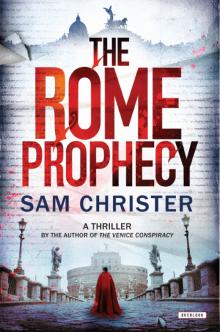 The Rome Prophecy
The Rome Prophecy The House Of Smoke
The House Of Smoke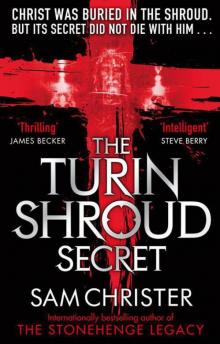 The Turin Shroud Secret
The Turin Shroud Secret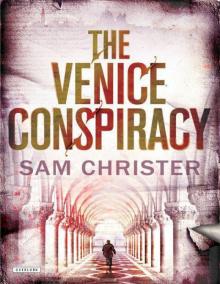 The Venice Conspiracy
The Venice Conspiracy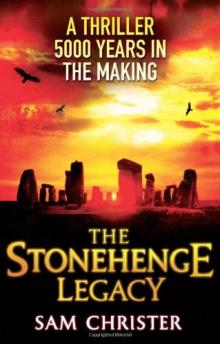 The Stonehenge Legacy
The Stonehenge Legacy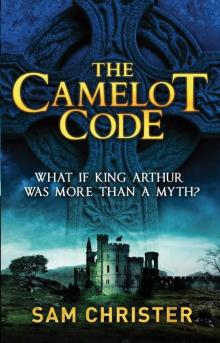 The Camelot Code
The Camelot Code